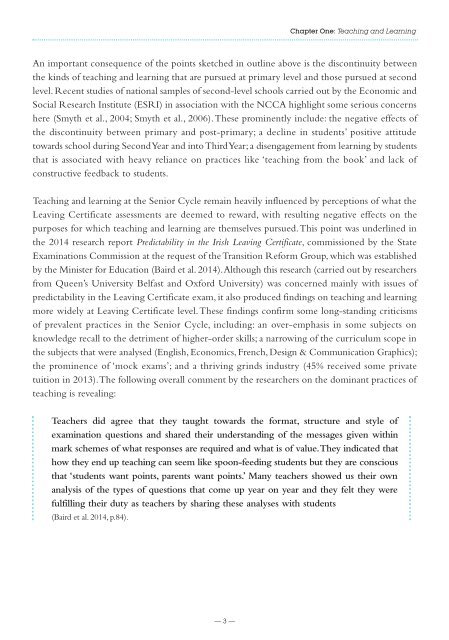Towards a Better Future
A Review of the Irish School System John Coolahan | Sheelagh Drudy Pádraig Hogan | Áine Hyland | Séamus McGuinness
A Review of the Irish School System
John Coolahan | Sheelagh Drudy Pádraig Hogan | Áine Hyland | Séamus McGuinness
Create successful ePaper yourself
Turn your PDF publications into a flip-book with our unique Google optimized e-Paper software.
Chapter One: Teaching and Learning<br />
An important consequence of the points sketched in outline above is the discontinuity between<br />
the kinds of teaching and learning that are pursued at primary level and those pursued at second<br />
level. Recent studies of national samples of second-level schools carried out by the Economic and<br />
Social Research Institute (ESRI) in association with the NCCA highlight some serious concerns<br />
here (Smyth et al., 2004; Smyth et al., 2006). These prominently include: the negative effects of<br />
the discontinuity between primary and post-primary; a decline in students’ positive attitude<br />
towards school during Second Year and into Third Year; a disengagement from learning by students<br />
that is associated with heavy reliance on practices like ‘teaching from the book’ and lack of<br />
constructive feedback to students.<br />
Teaching and learning at the Senior Cycle remain heavily influenced by perceptions of what the<br />
Leaving Certificate assessments are deemed to reward, with resulting negative effects on the<br />
purposes for which teaching and learning are themselves pursued. This point was underlined in<br />
the 2014 research report Predictability in the Irish Leaving Certificate, commissioned by the State<br />
Examinations Commission at the request of the Transition Reform Group, which was established<br />
by the Minister for Education (Baird et al. 2014). Although this research (carried out by researchers<br />
from Queen’s University Belfast and Oxford University) was concerned mainly with issues of<br />
predictability in the Leaving Certificate exam, it also produced findings on teaching and learning<br />
more widely at Leaving Certificate level. These findings confirm some long-standing criticisms<br />
of prevalent practices in the Senior Cycle, including: an over-emphasis in some subjects on<br />
knowledge recall to the detriment of higher-order skills; a narrowing of the curriculum scope in<br />
the subjects that were analysed (English, Economics, French, Design & Communication Graphics);<br />
the prominence of ‘mock exams’; and a thriving grinds industry (45% received some private<br />
tuition in 2013). The following overall comment by the researchers on the dominant practices of<br />
teaching is revealing:<br />
Teachers did agree that they taught towards the format, structure and style of<br />
examination questions and shared their understanding of the messages given within<br />
mark schemes of what responses are required and what is of value. They indicated that<br />
how they end up teaching can seem like spoon-feeding students but they are conscious<br />
that ‘students want points, parents want points.’ Many teachers showed us their own<br />
analysis of the types of questions that come up year on year and they felt they were<br />
fulfilling their duty as teachers by sharing these analyses with students<br />
(Baird et al. 2014, p.84).<br />
— 3 —



